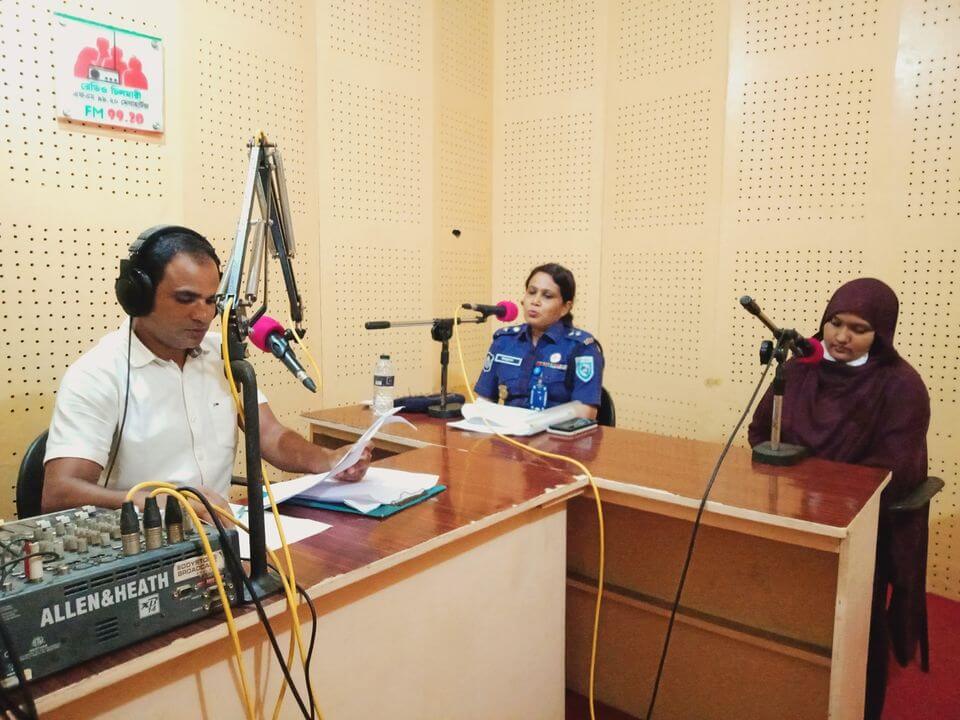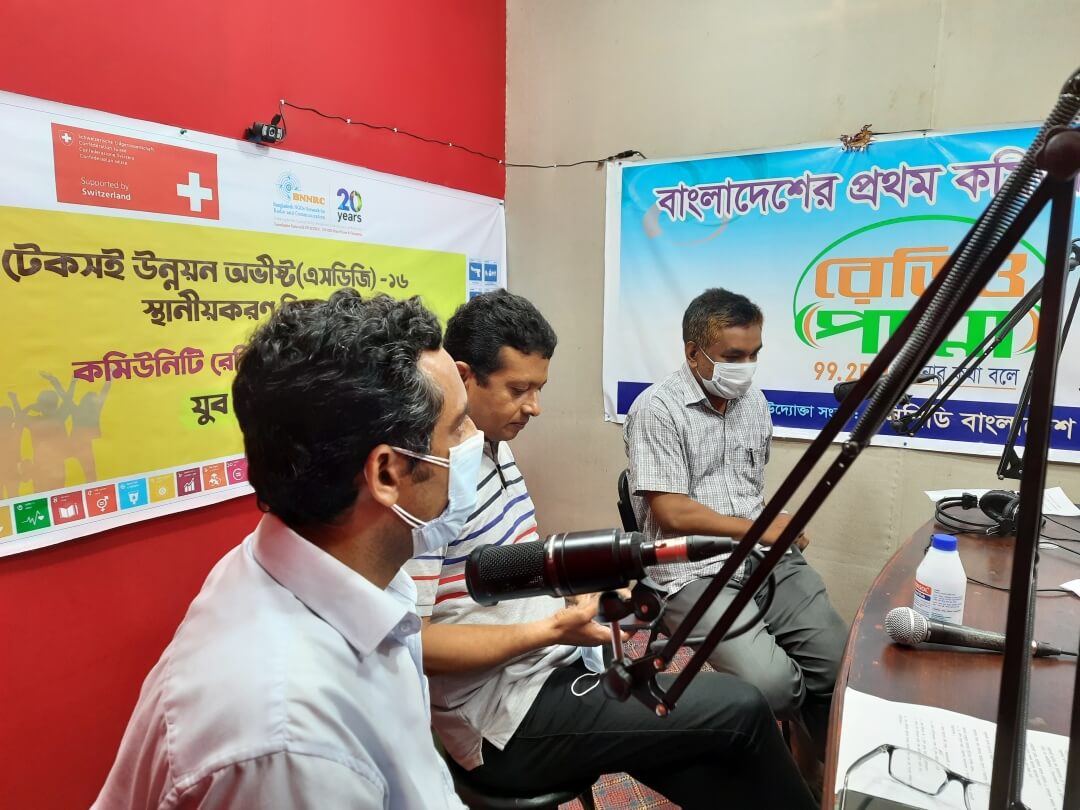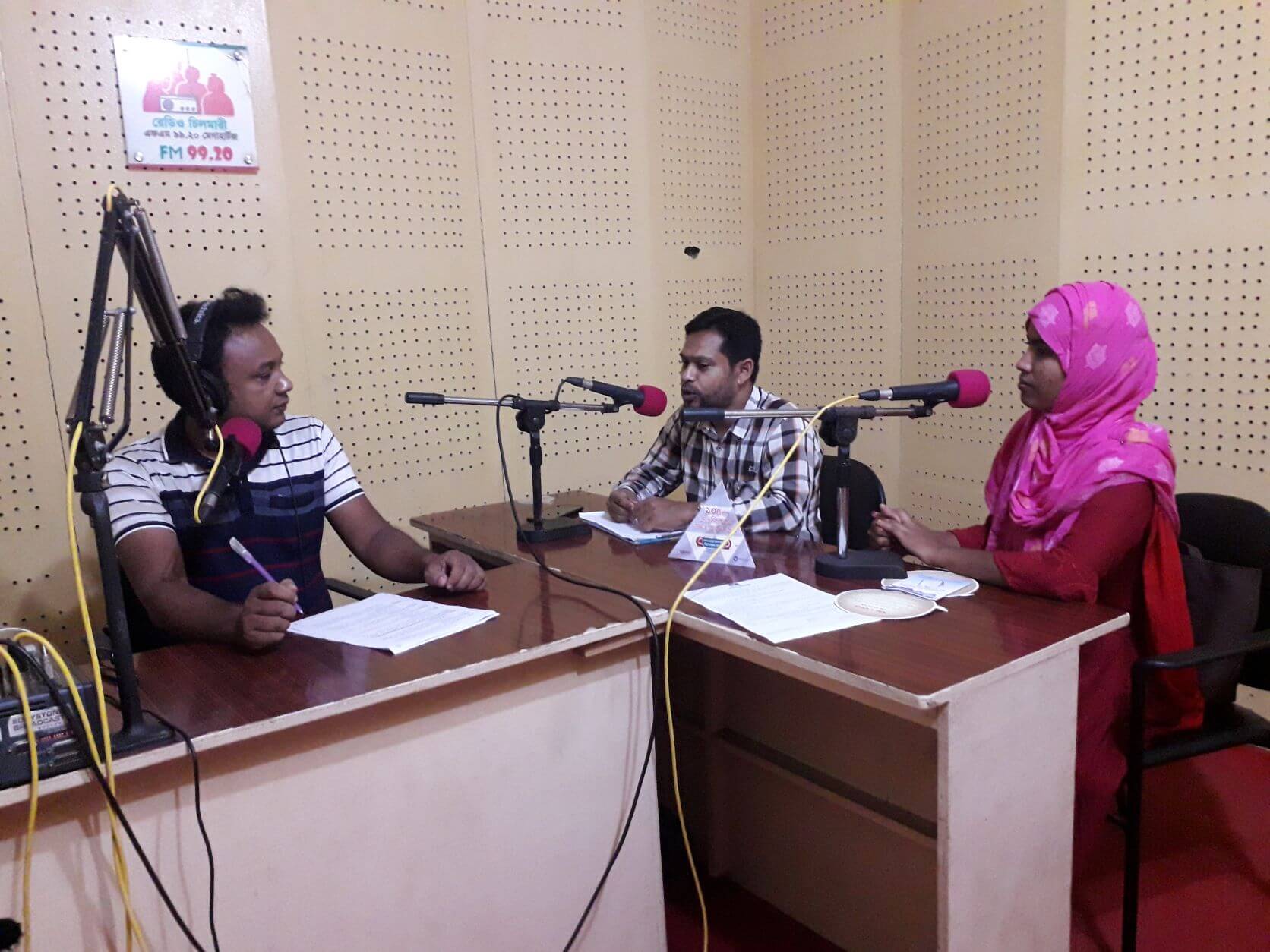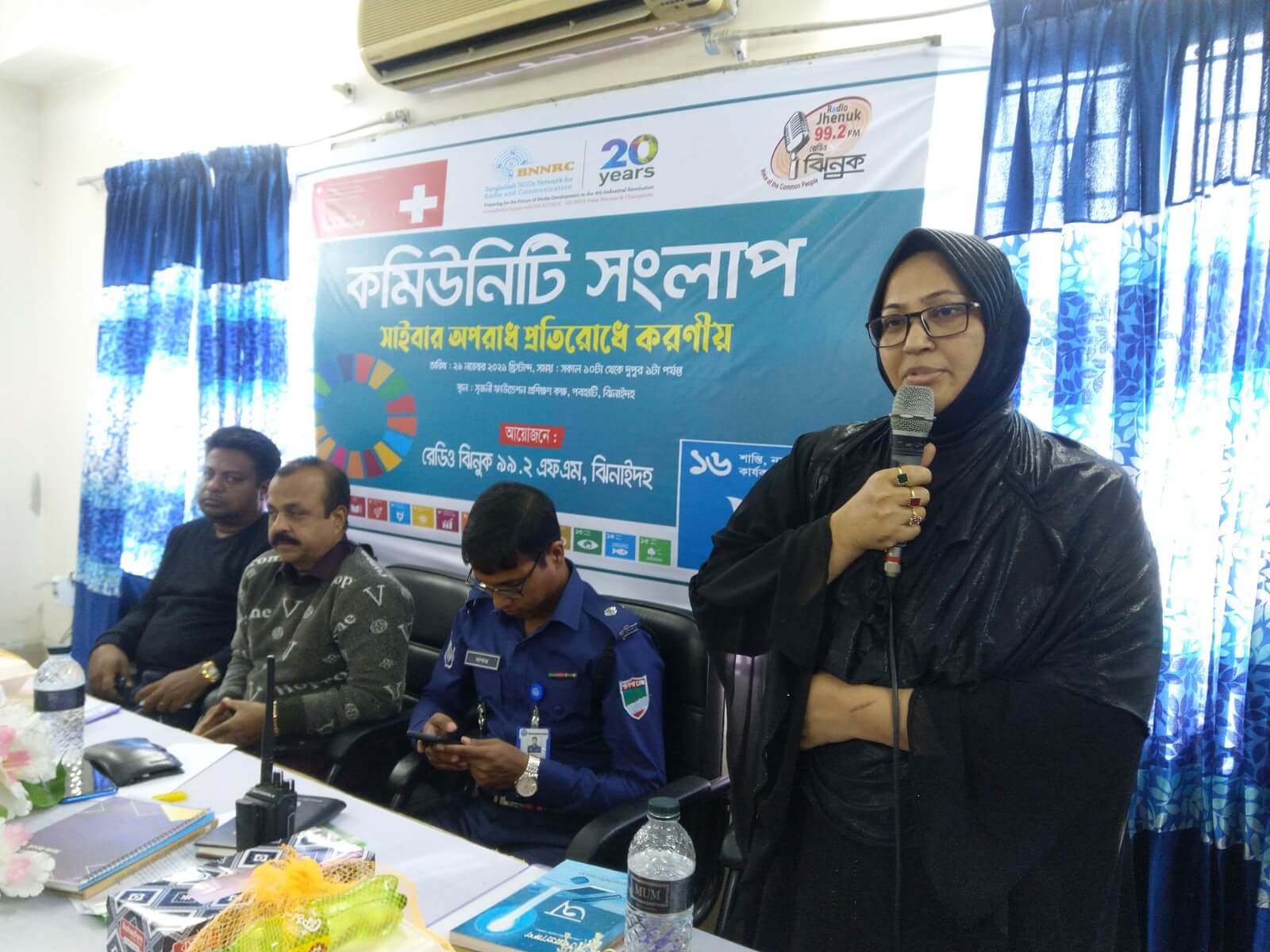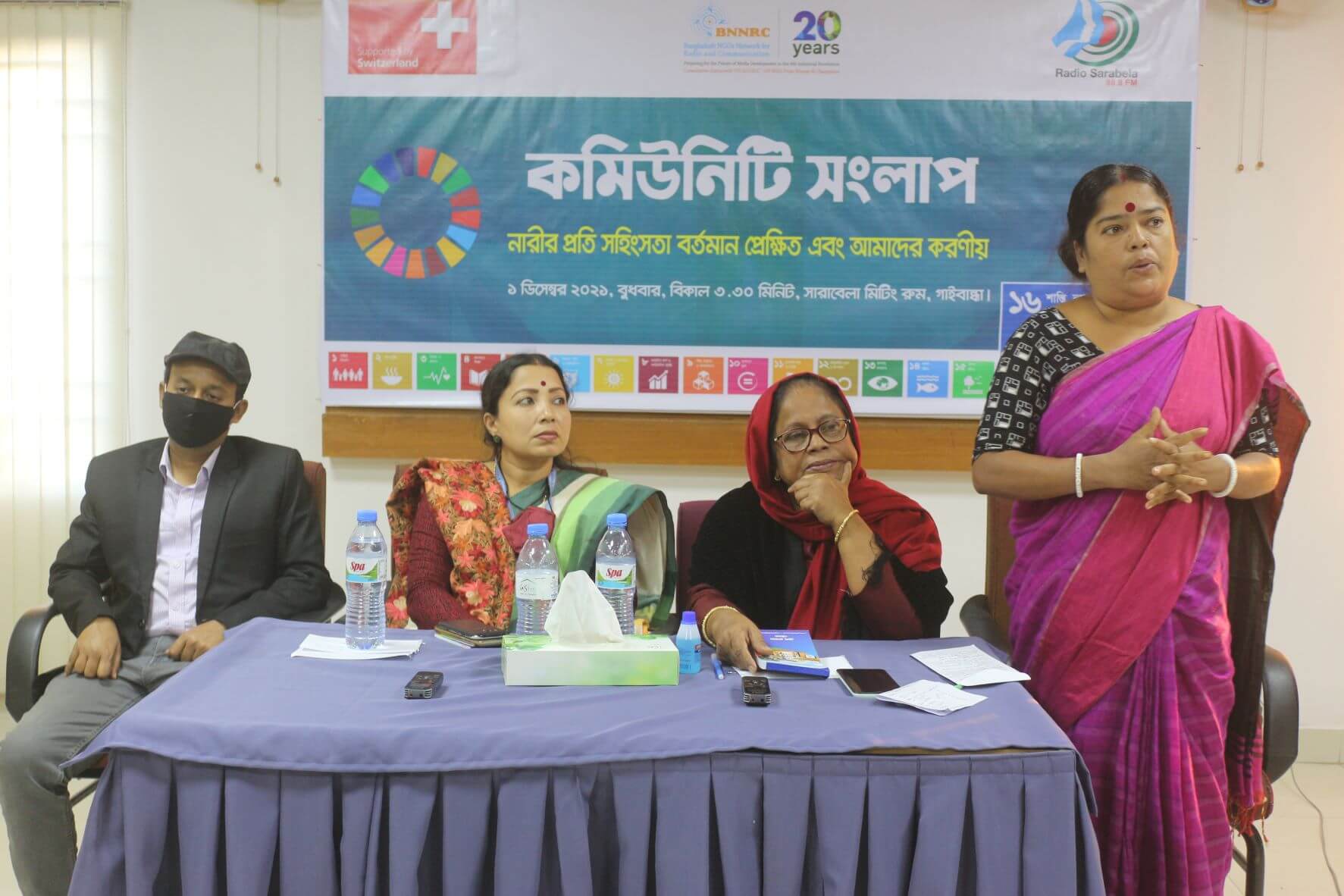Project description
SDG 16 Localization: Connecting, Voicing and Empowering community people through ICT and Community Media project sensitized community people including youth and other groups provided support to the disadvantaged people and marginalized communities. This support will enable the beneficiaries to learn, demand and access their rights to information and services for bringing positive changes in their lives and livelihood. The project also sensitized local government officials, civil society and policy makers through a participatory consultative process to identify policy gaps, provide recommendations and initiate adaptive measures for implementation of SDG-16.
SDG 16 is promoting peaceful and inclusive societies for sustainable development, providing access to justice for all and building effective, accountable and inclusive institutions at all levels. SDG 16 as a Goal is both an outcome and an enabler of sustainable development since it is closely interlinked with other SDGs. Without peace, justice, and inclusion, achieving goals such as ending poverty, ensuring education, promoting economic growth can be difficult or impossible. At the same time, various SDGs can help or hinder the achievement of SDG 16.
BNNRC has recognized that SDG-16 with its 12 wide-ranging targets on issues around peaceful, just and inclusive societies is linked with the achievement of the entire 2030 agenda. Fostering public debate and sensitizing the stakeholders on SDG-16 for creating a peaceful and inclusive society is essential for amplifying the voices of vulnerable, marginalized and excluded people and involving them in the development debate.
The activities have been carried-out to contribute to SDGs 1. End poverty in all its forms everywhere to reduce poverty in all its dimensions encouraged to implement nationally appropriate social protection systems and measures for all to 2030 achieve substantial coverage of the poor and the vulnerable. The programs contributed to Goal 2. End hunger, achieve food security and improved nutrition and promote sustainable agriculture to end hunger and ensure access by all people, in particular the poor and people in vulnerable situations, including infants, to safe, nutritious and sufficient food all year round and also contribute to Goal 3. Ensure healthy lives and promote well-being for all at all ages to achieve universal health coverage, including financial risk protection, access to quality essential health-care services and access to safe, effective, quality and affordable essential medicines and vaccines for all. The programs have been playing a significant role for achieving Goal 4 and promote inclusive and equitable quality education and encourage lifelong learning opportunities for all. It has been assisting all learners acquire the knowledge and skills needed to promote sustainable development, including, among others, through education for sustainable development and sustainable lifestyles, human rights, gender equality, promotion of a culture of peace and non-violence, global citizenship and appreciation of cultural diversity and of culture’s contribution to sustainable development.
Replicability
The project is possible to replicate for all over the country with the participation all community people. SDG 16 Localization focuses on inclusive societies, democracy, strong institutions, justice, and rule of law. SDG-16 is the key goal and the driver of all other sustainable goals. BNNRC aimed at fostering public debate for sustainable development for a peaceful and inclusive society. There is an intrinsic link between SDG-16 and SDG implementation. To foster public debate and sensitize stakeholders for convergence of these issues at the national and community level is very essential. Progress in implementation of SDG-16 is much better in Bangladesh due to wide focus of the Government on the goal, widen civil society space to raise concerns that are sensitive in nature for the Government and also lack of peoples’ awareness on accessing their rights to information. Considering the importance of the issue need to foster public debates and sensitize stakeholders at the national and community level with special emphasis on SDGs localization for a peaceful and inclusive society.
Community media has always inspired marginalized people especially community people to empower them through creating space and sensitized duty bearers through effective public access to reliable and timely information through ICT and community media. The initiative can be replicated in Bangladesh and another part of the world.
Sustainability
The ability of the community media is enhanced through the interventions of SDG-16 localization for community people including involving youths thus they can take the initiative to cope with the practice and respective community media houses will adopt the concept through the media. The community radio stations have been incorporated the issues of their regular program and content development and trying to sensitize the issue of SDG 16 localization process through their regular programs. How this topic has been discussed and shaped by Broadcasters, the community media, local administration, civil society and academics.
The Broadcasters learned about SDG 16 localization what the message looked like and how it might have been interpreted by audiences. Explain to someone else why it is important that we think about this issue carefully. Understand and critique the role of technology and the ‘new gatekeepers’ in enabling the community raise their awareness and participation to develop an inclusive society. Identify emerging best practices within the news industry for catching issue for their development.
Contribution to the implementations of WSIS Action Lines and the Sustainable Development Goals
The project has been addressed Action Line C-9 (Media).
Until the introduction of the concept in the Community Radio did not have proper knowledge on SDG-16 Localization in Bangladesh. It is indeed a new topic that BNNRC introduced for Community Media in Bangladesh. The interventions have generated ideas about SDG-16 Localization in Bangladesh, especially at the grassroots level. Bangladeshi community media learned the skills to produce unbiased, high-quality in-depth reporting and investigations which will ensure effective public access to reliable and timely information for SDG-16 Localization and keeping lives & livelihood easy of community people in all aspects of life through connecting, empowering and voicing of community people through the interventions.
The program is facilitating SDG:16 promote Peace Justice and Strong Institution, Quality Education-SDG:4, Good Health and Wellbeing-SDG:3, No poverty SDG:1, Zero Hunger-SDG-2
The initiative promotes peaceful and inclusive societies for sustainable development, provide access to justice for all and build effective, accountable, and inclusive institutions at all levels, providing access to information and knowledge to people is also important to fostering tolerance between people and contributes to more peaceful societies through promoting Quality Education-SDG:4, Good Health and Wellbeing-SDG:3, No poverty SDG:1, Zero Hunger-SDG-2.
Impact
Men and women are empowered and connected for making a just, inclusive, and peaceful society The Community Radio stations with their new technologies and ideas are working for SDG-16 Localization. The initiatives greater analytical depth and skills to broadcast programs for localization and the people are received ideas for developing an inclusive society
Deepened their critical understanding of how community media can better serve open societies in a vastly expanded media environment, Understood the factors that drive trust in community media and how much trust can be sustained or rebuilt. Being able to explain to someone else why community radios are working matters.
Challenges
The theme of SDG-16 Localization Community Media and ICT is comparatively new in Bangladeshi media and it would be challenging to introduce the issue to all media.
Mobilizing media on the theme would be a huge task with limited data and information from the ground. The media outlets need to understand more about what is SDG-16 Localization. The media need to know where to look for these causes and solutions. Lack of experienced resource persons to train the media is another challenge faced by the media.
The interventions have certainly generated tremendous enthusiasm among the participating community radio which encourages the media outlets to further plan and design how best to extend and expand the ideas among all print and electronic media.
Extended description
Project’s description (activity’s description)
- Organize Issue-based Social Open Dialogues through Community Radio:
- Develop and Broadcast programs on progress, challenges, and way forward on the 10 Targets of SDG-16:
- Digital storytelling through Community Radio and social media on 10 targets of SDG-16
- Develop and Broadcast program on amplifying youth and youth women voices and participation in SDGs opportunities:
- Fellowship for disadvantaged youth and youth women on SDGs
localization - Produce and publish a handbook for Community Radio SDG-16 with emphasis on SDG 16:10 and integration of COVID-19 for protecting infodemic through scientific and timely information
Implementing partners
Community Radio Padma 99.2FM, Monafer Morh, Rajshahi,
Email: radiopadma@gmail.com
Community Radio Nalta 99.2FM, Kaliganj, Satkhira,
Email: info_radionalta@naltahospital.org.bd
Community Radio Lokobetar 99.2FM, Barguna Sadar, Barguna,
Email: lokobetar@gmail.com
Community Radio Pollikontho 99.2FM, Matar Kapon, Moulvibazar
Email: pollikontho@gmail.com
Community Radio Sagor Giri 99.2FM, Shitakunda, Chattogram,
Email: sagorgiri@gmail.com
Community Radio Mahananda 98.8FM, Belepukur, Chapai Nawabgonj
Email: sm@radiomahananda.fm
Community Radio Mukti 99.2FM, Maloti Nagar, Bogura,
Email: news.rmfm.bd@gmail.com
Community Radio Chilmari 99.2FM, Chilmari, Kurigram
Email: radiochilmari@gmail.com
Community Radio Jhenuk 99.2FM, Pabahati, Jhenidah,
Email: radiojhenuk@gmail.com
Community Radio Krishi 99.8FM, Amtoli, Barguna,
Email: krishiradioais@gmail.com
Community Radio Naf 99.2FM, Teknaf, Cox’sbazar,
Email: radionaf@gmail.com
Community Radio Borendro 99.2FM, Naogoan Sadar, Naogoan,
Email: 99.20fm@gmail.com, info.borendroradio@gmail.com
Community Radio Bikrampur 99.2FM, Dewbhogh, Munshiganj,
Email: radio@ecbangladesh.org
Community Radio Meghna 99.0FM, Charfasion, Bhola,
Email: info@radiomeghna.net
Community Radio Sagardwip 99.2FM, Hatya, Noakhali,
Email: radioshagordwip@gmail.com
Community Radio Sarabela 98.8FM, Radhakrishnopur, Gaibandha
Email: radiosarabela@gmail.com
Community Radio Boral 99.0FM, Bagha, Rajshahi
Email radioboral.program@gmail.com, sm@radioboral.org
Community Radio Saikat 99.0FM, Kalatoli, Cox’s Bazar,
Email: saikatradio@gmail
Importance of Partnership
The project was implemented through the partnership with the Community Radio Stations in Bangladesh. The partnership is important to implement any new and innovative ideas and crucial for capacity building for the implementation of any new initiative. Capacity building involves empowering individuals and organizations with the knowledge, tools, and other resources they need to reach their goals. Partners’ support was also important for strengthening skills in achieving the goal of the project.
